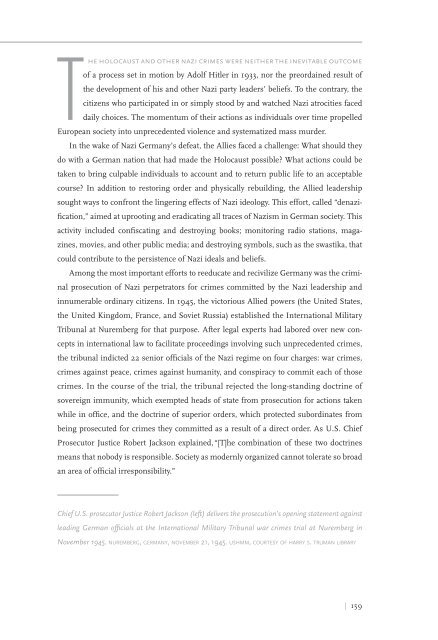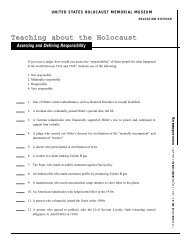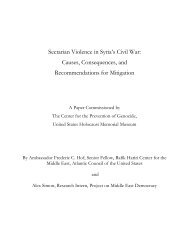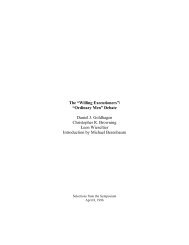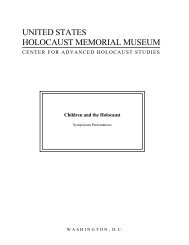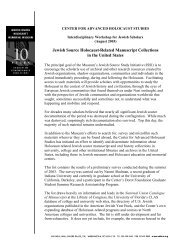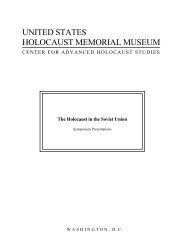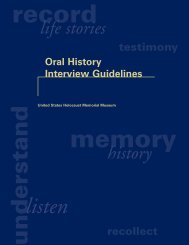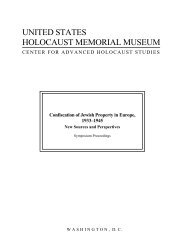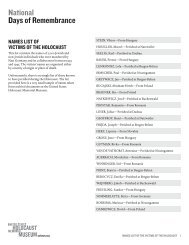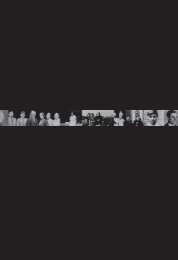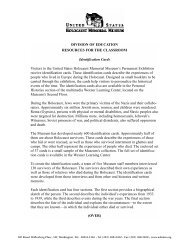the quest for racial purity - United States Holocaust Memorial Museum
the quest for racial purity - United States Holocaust Memorial Museum
the quest for racial purity - United States Holocaust Memorial Museum
Create successful ePaper yourself
Turn your PDF publications into a flip-book with our unique Google optimized e-Paper software.
he holocaust and o<strong>the</strong>r nazi crimes were nei<strong>the</strong>r <strong>the</strong> inevitable outcome<br />
of a process set in motion by Adolf Hitler in 1933, nor <strong>the</strong> preordained result of<br />
<strong>the</strong> development of his and o<strong>the</strong>r Nazi party leaders’ beliefs. To <strong>the</strong> contrary, <strong>the</strong><br />
citizens who participated in or simply stood by and watched Nazi atrocities faced<br />
daily choices. The momentum of <strong>the</strong>ir actions as individuals over time propelled<br />
European society into unprecedented violence and systematized mass murder.<br />
In <strong>the</strong> wake of Nazi Germany’s defeat, <strong>the</strong> Allies faced a challenge: What should <strong>the</strong>y<br />
do with a German nation that had made <strong>the</strong> <strong>Holocaust</strong> possible? What actions could be<br />
taken to bring culpable individuals to account and to return public life to an acceptable<br />
course? In addition to restoring order and physically rebuilding, <strong>the</strong> Allied leadership<br />
sought ways to confront <strong>the</strong> lingering effects of Nazi ideology. This ef<strong>for</strong>t, called “denazification,”<br />
aimed at uprooting and eradicating all traces of Nazism in German society. This<br />
activity included confiscating and destroying books; monitoring radio stations, magazines,<br />
movies, and o<strong>the</strong>r public media; and destroying symbols, such as <strong>the</strong> swastika, that<br />
could contribute to <strong>the</strong> persistence of Nazi ideals and beliefs.<br />
Among <strong>the</strong> most important ef<strong>for</strong>ts to reeducate and recivilize Germany was <strong>the</strong> criminal<br />
prosecution of Nazi perpetrators <strong>for</strong> crimes committed by <strong>the</strong> Nazi leadership and<br />
innumerable ordinary citizens. In 1945, <strong>the</strong> victorious Allied powers (<strong>the</strong> <strong>United</strong> <strong>States</strong>,<br />
<strong>the</strong> <strong>United</strong> Kingdom, France, and Soviet Russia) established <strong>the</strong> International Military<br />
Tribunal at Nuremberg <strong>for</strong> that purpose. After legal experts had labored over new concepts<br />
in international law to facilitate proceedings involving such unprecedented crimes,<br />
<strong>the</strong> tribunal indicted 22 senior officials of <strong>the</strong> Nazi regime on four charges: war crimes,<br />
crimes against peace, crimes against humanity, and conspiracy to commit each of those<br />
crimes. In <strong>the</strong> course of <strong>the</strong> trial, <strong>the</strong> tribunal rejected <strong>the</strong> long-standing doctrine of<br />
sovereign immunity, which exempted heads of state from prosecution <strong>for</strong> actions taken<br />
while in office, and <strong>the</strong> doctrine of superior orders, which protected subordinates from<br />
being prosecuted <strong>for</strong> crimes <strong>the</strong>y committed as a result of a direct order. As U.S. Chief<br />
Prosecutor Justice Robert Jackson explained, “[T]he combination of <strong>the</strong>se two doctrines<br />
means that nobody is responsible. Society as modernly organized cannot tolerate so broad<br />
an area of official irresponsibility.”<br />
Chief U.S. prosecutor Justice Robert Jackson (left) delivers <strong>the</strong> prosecution’s opening statement against<br />
leading German officials at <strong>the</strong> International Military Tribunal war crimes trial at Nuremberg in<br />
November 1945. nuremberg, germany, november 21, 1945. ushmm, courtesy of harry s. truman library<br />
| 159


